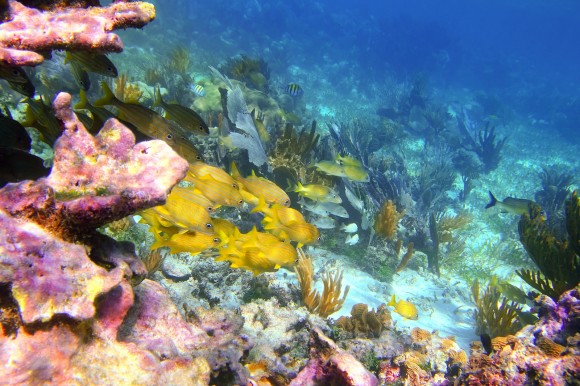Insurance broker Willis Tower Watson announced the launch of a multinational partnership to develop and implement insurance solutions that help protect and restore the endangered 1,000 kilometer (621 mile) barrier reef system along the Caribbean coast.
The Mesoamerican Reef Insurance Programme is the first multinational collaboration that will design and implement parametric insurance covering hurricane risk to the Mesoamerican Reef (MAR) and the communities that depend on it for protection, food security and livelihoods.
Pilot coverage for key reef sites in Mexico, Belize, Guatemala, and Honduras will enhance the climate resilience of almost 2 million beneficiaries, said WTW in a statement.
The project is being co-funded and implemented by Willis Towers Watson and the Mesoamerican Reef Fund (MAR Fund), the regional financing mechanism for large-scale maintenance, conservation, and restoration of the reef system. MAR Fund will be the policyholder of the insurance program.
Payouts will be triggered by the intensity of a hurricane, converted to an estimate of the extent of damage to the reef through a novel reef risk model. A group policy will cover the pilot reef sites, with a bespoke payout structure reflecting the cost of response at each reef site at different damage levels. The Ocean Risk and Resilience Action Alliance, with funding from Global Affairs Canada, supported the preliminary design of the insurance mechanism.
The Mesoamerican Barrier Reef System is listed as critically endangered by the International Union for Conservation of Nature (IUCN) Red List of Ecosystems and is home to 65 species of coral and more than 500 species of fish, as well as many other protected marine species. Coastal wetlands, lagoons, mangrove forests, and seagrass beds also protect against storms and coastal erosion, explained WTW.
As the effects of climate change and other stressors exert increasing pressure on the reef, the risk of a hurricane impact leading to irreversible coral degradation and mortality has grown. Early action to clean up the reef and jump-start regeneration and recovery is critical to reducing the overall impact of lost ecosystem services – in both social and economic terms.
However, WTW noted that the restoration of natural ecosystems is often not a priority in the aftermath of extreme events, as resources are focused mainly on property and grey infrastructure (which includes water and sewage treatment plants).
“This program [helps] us learn how insurance can provide a unique shared governance framework to manage reefs and other vulnerable natural ecosystems,” said John Haley, chief executive officer of Willis Towers Watson.
“This collaboration is a great opportunity for the MAR region. We see the insurance model as a risk management tool that will provide immediate funds for reef restoration, thereby contributing to strengthening coastal resilience, and to the recovery of the MAR and the environmental services it provides,” commented María José González, executive director of MAR Fund, explaining that the fund will be the policyholder and will manage the payouts.
“We will work closely with national governments and other partners and stakeholders to build the needed capacities for emergency response and preparedness,” she added.
The InsuResilience Solutions Fund (ISF), managed by Frankfurt School of Finance and Management and funded by KfW Development Bank, has signed the grant funding agreement for the insurance program.
“This partnership combines the expertise of local partners and the insurance sector, ensuring that products are developed according to the needs of the vulnerable population,” said Annette Detken, director of the ISF. “Our grant will co-fund the development and implementation of this innovative insurance product insuring coastal ecosystems that provide much needed services for local communities. We believe this insurance solution could serve as a model for other countries seeking to protect important natural assets, like coral reefs.”
“Tangible examples like this demonstrate the possibilities for innovative financing to support practical action to build the resilience of crucial ecosystems and the communities, livelihoods, and biodiversity they support, and to unlock large-scale investments in natural assets which are critical to address loss of biodiversity and increasing impacts of climate change,” noted Simon Young, a senior director in the Climate and Resilience Hub at Willis Towers Watson.
About WTW’s Climate and Resilience Hub
The Climate and Resilience Hub (CRH) is the focal point for Willis Towers Watson’s climate expertise and capabilities, pooling knowledge from across the broker’s people, risk, and capital businesses and from our collaborations to deliver climate and resilience solutions in response to a range of regulatory, investor, consumer, employee, and operating pressures. Under the Climate Quantified™ brand, it delivers analytics, advice and transactions to enable corporate, finance, and public sector institutions to embrace the climate decade ahead.
Source: Willis Towers Watson
Was this article valuable?
Here are more articles you may enjoy.



 BMW Recalls Hundreds of Thousands of Cars Over Fire Risk
BMW Recalls Hundreds of Thousands of Cars Over Fire Risk  Insurance Issue Leaves Some Players Off World Baseball Classic Rosters
Insurance Issue Leaves Some Players Off World Baseball Classic Rosters  Judge Awards Applied Systems Preliminary Injunction Against Comulate
Judge Awards Applied Systems Preliminary Injunction Against Comulate  Kansas Man Sentenced for Insurance Fraud, Forgery
Kansas Man Sentenced for Insurance Fraud, Forgery 

